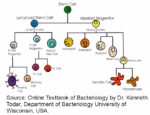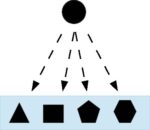The purpose of this paper is to abstractly describe the notion of a generative mechanism
that implements a code and to provide a number of examples including the DNA-RNA machinery that
implements the genetic code, Chomsky’s Principles & Parameters model of a child acquiring a specific
grammar given ‘chunks’ of linguistic experience (which play the role of the received code), and embryonic
development where positional information in the developing embryo plays the role of the received code.
Generative Mechanisms
How to understand quantum mechanics
This paper tries to elucidate the paradoxical aspects of quantum mechanics (QM) by using a simplified pedagogical model of QM based on the support sets of the state vectors, by assuming an ontology of superposition-as-objective indefiniteness, and by not giving any ontological interpretation to the computational device of the wave function.
“Follow the Math” Preprint
The slogan “Follow the money” means that finding the source of an organization’s or person’s money may reveal their true nature. In a similar sense, we use the slogan “Follow the math!” to mean that finding “where the mathematics of QM comes from” reveals a good deal about the key concepts and machinery of the theory.
Partitions, Objective Indefiniteness, and Quantum Reality
This paper, published in the International Journal for Quantum Foundations, is a shorter introductory paper following up on my recent “Follow the Math!” paper in the Foundations of Physics. The point is to show that the mathematics of QM is the vector (Hilbert) space version of the mathematics of partitions at the set level. […]
4Open: Special Issue: Intro. to Logical Entropy
4Open is a relatively new open access interdisciplinary journal (voluntary APCs) covering the 4 fields of mathematics, physics, chemistry, and biology-medicine. A special issue on Logical Entropy was sponsored and edited by Giovanni Manfredi, the Research Director of the CNRS Strasbourg. My paper is the introduction to the volume.
Probability Theory with Superposition Events
In finite probability theory, events are subsets S⊆U of the outcome set. Subsets can be represented by 1-dimensional column vectors. By extending the representation of events to two dimensional matrices, we can introduce “superposition events.”
Counting Direct-sum Decompositions
This paper uses elementary methods to derive the formulas for and to tablulate (in the case q = 2) two related q-analogs of the Stirling numbers of the second kind and the Bell numbers for direct-sum decompositions (vector space analogs of set partitions) of a finite vector space over a finite field with q elements.
The implication operation on partitions
Partitions and equivalence relations In a 2001 commemorative volume for my mathematical mentor, Gian-Carlo Rota, three of his associates noted that “the only operations on the family of equivalence relations fully studied, understood and deployed are the binary join and meet operations.” This note defines the apparently new operation of implication for partitions, an operation […]






